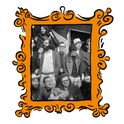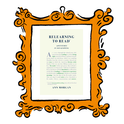A storm of rage brought him to his feet, stamping up and down the lobby. Billy Connolly was better known than Rory MacBleaney for bad bad bad bad bad reasons. Connolly and his what—partner? second wife?—had been pally with Prince Charles and Diana before the royal divorce, what claim to fame was that? Connolly was not a bad comedian—not as good as Jimmy Logan, though still quite good—but he was not an actor! In his biggest film, Mrs Brown, he had played Queen Victoria's Highland gillie with a Glasgow accent! It was the only accent he could do! The English and Americans didn't mind because they think every Scottish accent is the same, but every Scot in the world knew Connolly's voice was wrong in that part. Connolly must have known his voice was wrong! So he had only taken the part for the money and the fame. How could he stoop so low?
"I could have played John Brown!" said Mr Mac-Bleaney aloud. "Yes, my normal accent too is Glaswegian, but I'm enough of an actor to sound like a teuchter from Drumnadrochit when I want to, yess inteet to gootness Donalt, whateffer. Shimerahaa mahay!"
A fit of coughing made him sit on the step again, no longer happy, because directly or indirectly Billy Connolly was responsible for everything that had gone wrong with Scotland—small shops replaced by supermarkets, local schools and hospitals amalgamated into big central ones, and nobody asked to recall the old ways and speak for elderly marginalised folk. Newspapers no longer phoned the third Mr Glasgow for soundbites on politics and showbusiness; no wonder he had started drinking again. Gloria had foreseen that. When they knew she was dying she had not gone out of her mind (as he had) but had calmly discussed their finances with an accountant and lawyer, and made him sign forms so that his home and finances were secure no matter how stupidly he acted. O yes she had loved him. He wept for a while then began to cheer up.
The smoking ban had been wonderful for him! At first he thought it would kill him because smoking had made him drink more slowly. It still did because now he went outside to smoke, standing and puffing on pavements with other nicotine addicts. This had given him a new lease of life. Being now a persecuted minority, smokers shared a liberty, equality and fraternity unknown to those who skulked in pubs until closing time. He had new friends because of the ban—older folk who remembered him as a footballer, sports commentator, actors, also younger folk who enjoyed his tales of those times. One usually brought him home in a taxi, often a woman, though it was hard to remember which—most women under fifty seemed equally attractive nowadays. None had stayed the night, yet he still had hopes.

While doing this, something happened so suddenly that he neither understood nor remembered it afterward. For a time he seemed comfortably at home in bed, in a darkness suitable to someone who has wakened in the early hours of a winter morning, yet he seemed to hear people overhead discussing him, though their words made no sense. That did not worry him, and soon he was asleep for good.
Mr MacBleaney's memories had been making him feel warm and happy, but now he felt the hard, cold step under his bum and tired of life because the critic had said, "You were quite good, but of course they only employed you because they couldn't afford Billy Connolly."
A storm of rage brought him to his feet, stamping up and down the lobby. Billy Connolly was better known than Rory MacBleaney for bad bad bad bad bad reasons. Connolly and his what—partner? second wife?—had been pally with Prince Charles and Diana before the royal divorce, what claim to fame was that? Connolly was not a bad comedian—not as good as Jimmy Logan, though still quite good—but he was not an actor! In his biggest film, Mrs Brown, he had played Queen Victoria's Highland gillie with a Glasgow accent! It was the only accent he could do! The English and Americans didn't mind because they think every Scottish accent is the same, but every Scot in the world knew Connolly's voice was wrong in that part. Connolly must have known his voice was wrong! So he had only taken the part for the money and the fame. How could he stoop so low?
"I could have played John Brown!" said Mr Mac-Bleaney aloud. "Yes, my normal accent too is Glaswegian, but I'm enough of an actor to sound like a teuchter from Drumnadrochit when I want to, yess inteet to gootness Donalt, whateffer. Shimerahaa mahay!"
A fit of coughing made him sit on the step again, no longer happy, because directly or indirectly Billy Connolly was responsible for everything that had gone wrong with Scotland—small shops replaced by supermarkets, local schools and hospitals amalgamated into big central ones, and nobody asked to recall the old ways and speak for elderly marginalised folk. Newspapers no longer phoned the third Mr Glasgow for soundbites on politics and showbusiness; no wonder he had started drinking again. Gloria had foreseen that. When they knew she was dying she had not gone out of her mind (as he had) but had calmly discussed their finances with an accountant and lawyer, and made him sign forms so that his home and finances were secure no matter how stupidly he acted. O yes she had loved him. He wept for a while then began to cheer up.
The smoking ban had been wonderful for him! At first he thought it would kill him because smoking had made him drink more slowly. It still did because now he went outside to smoke, standing and puffing on pavements with other nicotine addicts. This had given him a new lease of life. Being now a persecuted minority, smokers shared a liberty, equality and fraternity unknown to those who skulked in pubs until closing time. He had new friends because of the ban—older folk who remembered him as a footballer, sports commentator, actors, also younger folk who enjoyed his tales of those times. One usually brought him home in a taxi, often a woman, though it was hard to remember which—most women under fifty seemed equally attractive nowadays. None had stayed the night, yet he still had hopes.
The cold step again reminded him where he was, then a sudden memory made him stand joyfully up. Gloria, in case one of them got locked out, had put a copy of the apartment key on top of the door frame. Being about three inches taller than him she could easily reach it by standing on tiptoe. They had never needed to use that key so it must still be there. A low box or stool was all he needed to reach it, but the hour was far too late to rouse a neighbour and borrow one; he must use the rocking chair. He pushed it over the marble tiles until the hind rockers and chair-back together touched the door, but this left the seat at an angle impossible to stand upon. He turned it round and put the front against the door, but now the back and arms stopped him climbing onto it, so he placed it sideways against the door. Holding the doorknob, he managed to kneel on the seat, which still rocked a little. Standing upright was a delicate balancing act. He did it by keeping hold of the doorknob with one hand, grasping the chair-back with the other, and cautiously raising his left leg until the foot was flat on the seat. That done, with equal caution, he began straightening the leg, then gradually raising his body while letting go of the doorknob and reaching upward to—
While doing this, something happened so suddenly that he neither understood nor remembered it afterward. For a time he seemed comfortably at home in bed, in a darkness suitable to someone who has wakened in the early hours of a winter morning, yet he seemed to hear people overhead discussing him, though their words made no sense. That did not worry him, and soon he was asleep for good.











